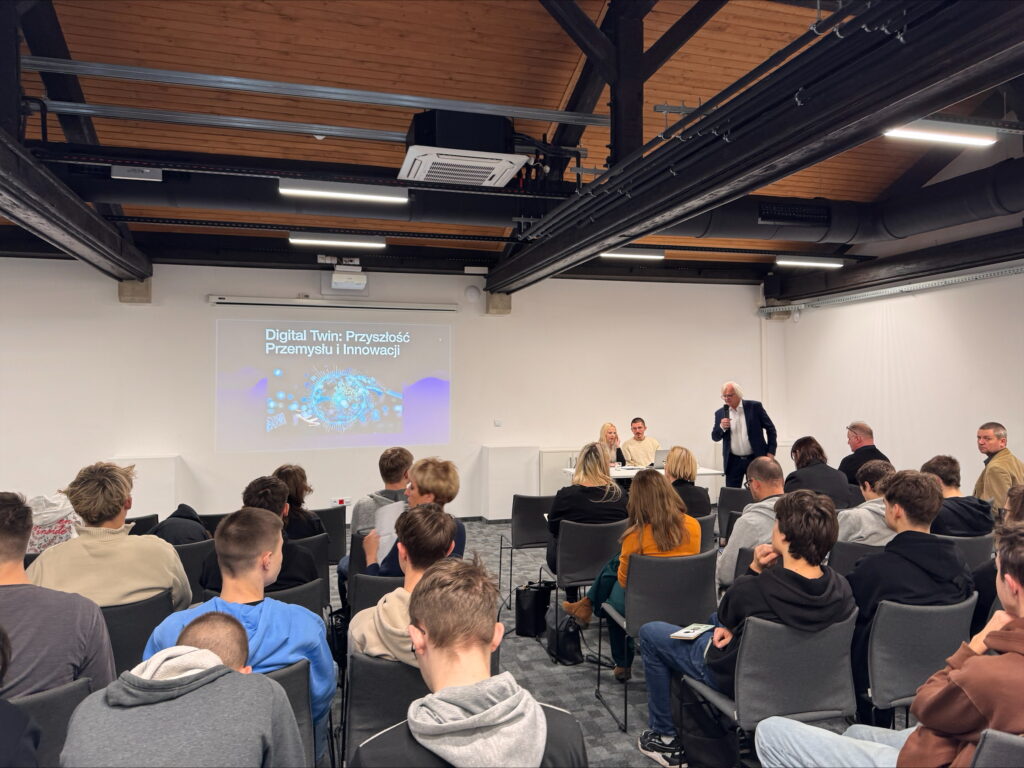On Tuesday, 10 December 2024, the DiTwin project hosted a multiplier event at the stunning Museum of Engineering and Technology in Kraków. The event was attended by 23 vocational school teachers, representatives of foundations, NGOs, specialist vocational education institutions, and 49 vocational school students.

The meeting’s agenda included a presentation by second-year journalism students from UKEN, who introduced the concept of Digital Twin technology. Dr. hab. Krzysztof Gurba, a professor at UKEN, also delivered a presentation outlining the DiTwin project’s concept, assumptions, expected outcomes, and current progress. At the conclusion of the event, participants had the opportunity to network and engage with project contributors.
The first presentation, focused on explaining what Digital Twin technology is, was delivered by second-year journalism students from UKEN: Kinga Tokarczyk and Mikołaj Kawa.
During their talk, they defined a Digital Twin as “a virtual copy of a real object, system, or process.”
- “Imagine a digital version of a car, a plane, or even a heart! Thanks to sensors that collect data in real time, these models are always up-to-date and accurately reflect the state of the real object,” explained Kinga Tokarczyk.
The students further elaborated on the applications of Digital Twin technology in various fields:
- Industry: Production optimization, cost reduction, and fault prediction.
- Energy: Network management and energy efficiency.
- Transport: Fleet monitoring, route optimization, and safety improvements.
- Healthcare: Personalization of treatment and health monitoring.
- Smart Cities: Urban infrastructure and traffic management.
They also highlighted the benefits of Digital Twin technology, which include:
- Cost reduction
- Increased efficiency
- Improved safety
- Failure prediction
- Resource optimization
However, they also acknowledged the challenges associated with its implementation:
- High implementation costs
- Data security concerns
- Data quality issues
- Infrastructure barriers
Dr. hab. Krzysztof Gurba, Prof. UKEN, delivered the second presentation, focusing on the DiTwin project’s relevance to vocational education. He explained how Digital Twin technology can revolutionize education.
Prof. Gurba emphasized that the project aims to prepare young people for the challenges of Industry 4.0 and 5.0 by leveraging modern technologies as educational tools. He highlighted the international collaboration behind the project, which includes partners such as Learnable (Italy), Digital Smart (Italy), Innovation Frontiers (Greece), Training Vision (Ireland), Malaga TechPark (Spain), Universidad de Malaga (Spain), and the University of the National Education Commission in Kraków (Poland).
The project’s outputs include:
- A Qualification and Competence Framework for Digital Twins.
- Educational modules and a platform for students to acquire practical knowledge.
- A handbook for teachers and an online course.
- Video tutorials for self-study.
Prof. Gurba explained that the project focuses on three key areas: 3D printing, robotics, and process automation. The platform developed as part of the project will offer:
- Access to digital twins of various devices.
- Remote programming and testing capabilities.
- Online technical support and offline recordings.
To conclude, Prof. Gurba announced upcoming pilot tests and a demonstration event for the system. He invited teachers, institutional partners, foundations, and training organizations to collaborate in developing the teacher handbook. He also announced a focus study scheduled for January 2025.
